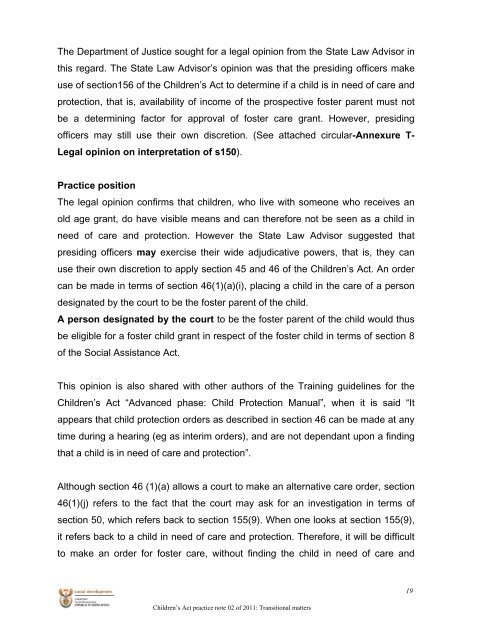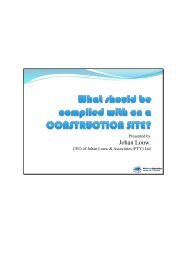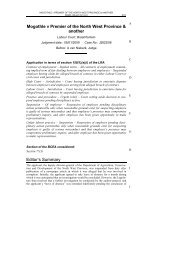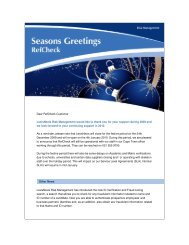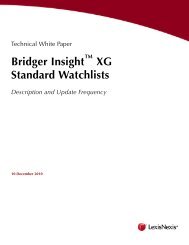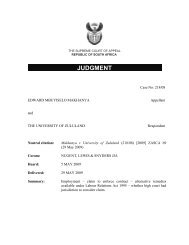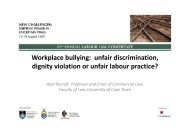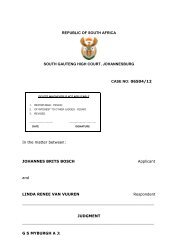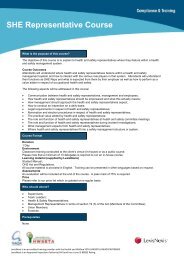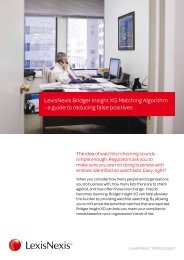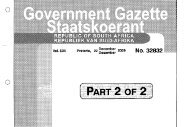Children's Act Practice Note 2 of 2011 - LexisNexis South Africa
Children's Act Practice Note 2 of 2011 - LexisNexis South Africa
Children's Act Practice Note 2 of 2011 - LexisNexis South Africa
Create successful ePaper yourself
Turn your PDF publications into a flip-book with our unique Google optimized e-Paper software.
The Department <strong>of</strong> Justice sought for a legal opinion from the State Law Advisor inthis regard. The State Law Advisor’s opinion was that the presiding <strong>of</strong>ficers makeuse <strong>of</strong> section156 <strong>of</strong> the Children’s <strong>Act</strong> to determine if a child is in need <strong>of</strong> care andprotection, that is, availability <strong>of</strong> income <strong>of</strong> the prospective foster parent must notbe a determining factor for approval <strong>of</strong> foster care grant. However, presiding<strong>of</strong>ficers may still use their own discretion. (See attached circular-Annexure T-Legal opinion on interpretation <strong>of</strong> s150).<strong>Practice</strong> positionThe legal opinion confirms that children, who live with someone who receives anold age grant, do have visible means and can therefore not be seen as a child inneed <strong>of</strong> care and protection. However the State Law Advisor suggested thatpresiding <strong>of</strong>ficers may exercise their wide adjudicative powers, that is, they canuse their own discretion to apply section 45 and 46 <strong>of</strong> the Children’s <strong>Act</strong>. An ordercan be made in terms <strong>of</strong> section 46(1)(a)(i), placing a child in the care <strong>of</strong> a persondesignated by the court to be the foster parent <strong>of</strong> the child.A person designated by the court to be the foster parent <strong>of</strong> the child would thusbe eligible for a foster child grant in respect <strong>of</strong> the foster child in terms <strong>of</strong> section 8<strong>of</strong> the Social Assistance <strong>Act</strong>.This opinion is also shared with other authors <strong>of</strong> the Training guidelines for theChildren’s <strong>Act</strong> “Advanced phase: Child Protection Manual”, when it is said “Itappears that child protection orders as described in section 46 can be made at anytime during a hearing (eg as interim orders), and are not dependant upon a findingthat a child is in need <strong>of</strong> care and protection”.Although section 46 (1)(a) allows a court to make an alternative care order, section46(1)(j) refers to the fact that the court may ask for an investigation in terms <strong>of</strong>section 50, which refers back to section 155(9). When one looks at section 155(9),it refers back to a child in need <strong>of</strong> care and protection. Therefore, it will be difficultto make an order for foster care, without finding the child in need <strong>of</strong> care andChildren’s <strong>Act</strong> practice note 02 <strong>of</strong> <strong>2011</strong>: Transitional matters19


